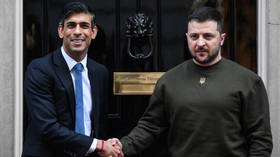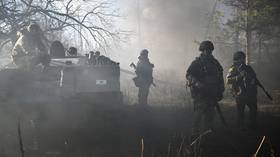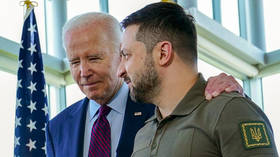Sergey Poletaev: Here's why the new British-Ukrainian defense agreement is great news for Russia

The Ukrainian elite have been obsessed with obtaining security guarantees from the West since the early 1990s. Over the years, as Kiev has increasingly sought conflict with Russia, it has also tried to hide behind the US-led bloc's back, hoping to one day join NATO and the European Union.
This carry-on eventually led to the start of Russia’s military operation, almost two years ago. Its first stage ended with negotiations in Istanbul in March-April 2022. Under the agreements, Kiev was supposed to receive security guarantees as long as it complied with the terms. France, the UK, and the US were supposed to become the guarantors.
It's not yet fully understood why the deal collapsed but, apparently, President Vladimir Zelensky had a problem with the security guarantees. He reportedly thought they meant that the West would fight against Russia directly. But Boris Johnson, who visited Kiev at that time, seemingly said that neither he nor anyone else would agree to such terms. However, it was possible to help Ukraine fight by providing weapons and money.
For the next year, the Ukrainians were full of bravado. Kiev considered the defeat of Russian troops a ‘done deal’ and stated that the West was interested in accepting the country into NATO in order to control its supposedly immense military power. They also claimed that Ukraine itself would decide whether or not to join the bloc because security guarantees provided by individual countries might have been a better option; and that Kiev would see what the West offered and dictate its own terms.
Apparently, the Ukrainian elite were not bothered by the fact that they were never actually invited to join NATO and that the West was in no hurry to provide military assurances, even when their forces demonstrated progress on the battlefield.
Things continued this way until July 2023, when, in the middle of Ukraine’s much-hyped counteroffensive, a NATO summit was held in Vilnius. Kiev immediately declared it to be of historic importance. Zelensky's team expected that during the course of this event, their prospects of joining the bloc would finally become clear – even if it meant waiting years to become a member or having to give up Crimea and Donbass. Ukraine was ready to accept any terms, just to get under the coveted NATO umbrella.
At the summit in Vilnius, however, representatives of the organization merely uttered a few platitudes and advised the Ukrainians to negotiate with the G7 countries on an individual basis and see what terms they offered.
Promises don’t mean guarantees
So, six months down the line, the current UK prime minister arrived in Kiev and, in between the usual selfies with female train conductors, he signed the first UK-Ukraine agreement.
The event didn’t receive widespread attention, but among the experts who have commented on it, opinions have differed markedly. Rishi Sunak's opponents in the UK insist that it's merely a PR move – an attempt to raise his faltering ratings, which have plunged to a record low. In Russia, some experts have called it a meaningless piece of paper, without thoroughly reading the document. For their part, Ukrainian analysts have declared the agreement to be an important milestone, an epochal moment, and tried to sell it as even more significant than actual accession to NATO.
The agreement is indeed important and is worth reading carefully. Firstly, the main slogan of the past two years (usually declared on behalf of the entire Western coalition) has been literally incorporated into the text: “The UK will continue to support Ukraine for as long as it needs, so that Ukraine can effectively defend itself.” In other words, it’s just like Boris Johnson said – we will not fight for you, but we’ll do what we can to help you.
Secondly, for the next ten years – the entire duration of the agreement – the document notes that no territorial changes will be recognized. “The participants will work together, and with other partners of Ukraine, to ensure Ukrainian Armed Forces and security forces are able to fully restore Ukraine’s territorial integrity within its internationally recognized borders.”
As for the actual obligations on the part of the UK, the text includes only one point:
“In the event of a future Russian armed attack against Ukraine, at the request of either of the participants, the participants will consult within 24 hours to determine measures needed to counter or deter the aggression.”
It further states: “The UK undertakes that, in those circumstances, and acting in accordance with its legal and constitutional requirements, it would: provide Ukraine with swift and sustained security assistance, modern military equipment across all domains as necessary, and economic assistance.”
The amount of future economic assistance corresponds to the current military aid provided by the UK to Ukraine, which is believed to be between £2.3 billion ($2.9 billion) and £2.5 billion ($3.2 billion) in 2023 and 2024.
In the rest of the document, we find non-binding general statements – for example, that the sides will “work together on deepening cooperation and partnership... strengthen [their] long-term relationship... provide advice and support... make significant contributions... create joint working groups..." and blah, blah, blah. All the usual technocratic claptrap of polite, mostly meaningless, words.
Despite the general non-binding nature of the agreement, however, it clearly shows that Ukraine is getting tangled up in the web of Western influence and control. The document practically states that all the activities of the Ukrainian state will revolve around the interests of the UK: from the defense industry to civil and military construction, information security, the fight against corruption and organized crime, the distribution of humanitarian aid, and general economic issues. It gives global financial institutions virtually unlimited access to Ukraine.
Moreover, among the numerous Western-style reforms that Ukraine is obliged to carry out, the agreement stipulates “democratic civilian control of the Armed Forces, [as] an important indicator of the non-politicization of the Armed Forces.” This looks a lot like an attempt by Zelensky to enlist the support of the West in his conflict with Zaluzhny.
Why is this important?
Ukraine has been quick to declare that the Sunak-Zelensky deal will serve as an example for similar agreements with other G7 countries (France will probably sign a similar document next month). Such agreements will provide a legal backbone for the West’s Ukraine policy, which can be explained as follows: Kiev is the West’s tool.
It sends the Ukrainians a clear signal: You are our outpost, our weapon, our battering ram, or whatever else, but you are not one of us. We will not put ourselves at risk for your sake, and there’s no place for you under the NATO umbrella.
For its part, Russia will understand the UK-Ukraine agreement as follows: The West will not back down, it will make your life difficult “for as long as it needs” to be done, and it will try to make sure that Ukraine remains its proxy force against you; however, it will not get involved in this conflict directly.
The course of the conflict shows that the Western strategy is failing: logistical support is insufficient, Ukraine's resources are depleting, its army is becoming weaker and cannot defeat Russia on the battlefield. This means that Kiev may suffer a major collapse long before Russia begins to experience serious challenges.
As we’ve said earlier, Russia’s goal is to prevent Ukraine from being used as a battering ram by the West. Since it cannot come to an amicable agreement with the leadership in Kiev (which will be impossible for at least another ten years if other G7 countries follow the example of the UK by signing similar deals), Moscow has only one option left – to dismantle the hostile Ukrainian state.
One positive is that the Sunak-Zelensky pact has assured Moscow that this can be done without too much risk, given the West does not plan to directly intervene in the war.
For Ukraine, this is indeed bad news. If Kiev possessed at least some foresight, especially after signing such a meaningless agreement, it would try to establish some sort of dialogue with Moscow while the option is still there. But instead, Zelensky's team continue to push their nation towards complete destruction.
















